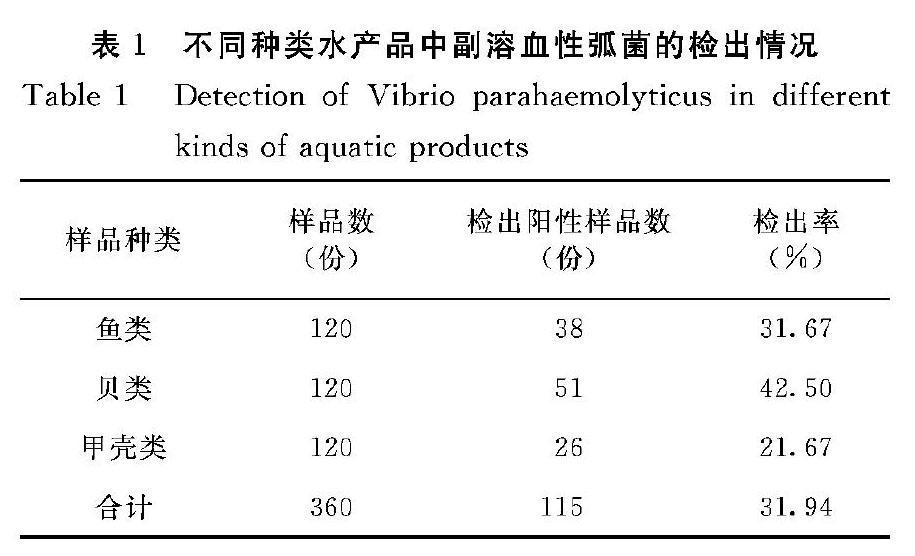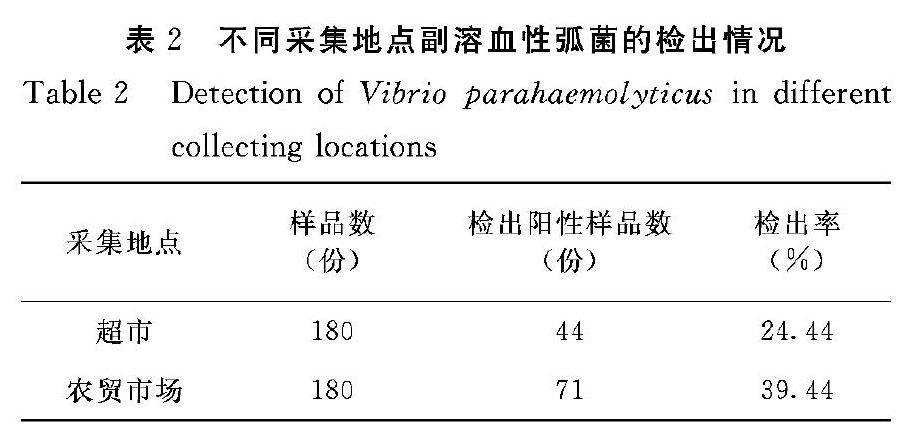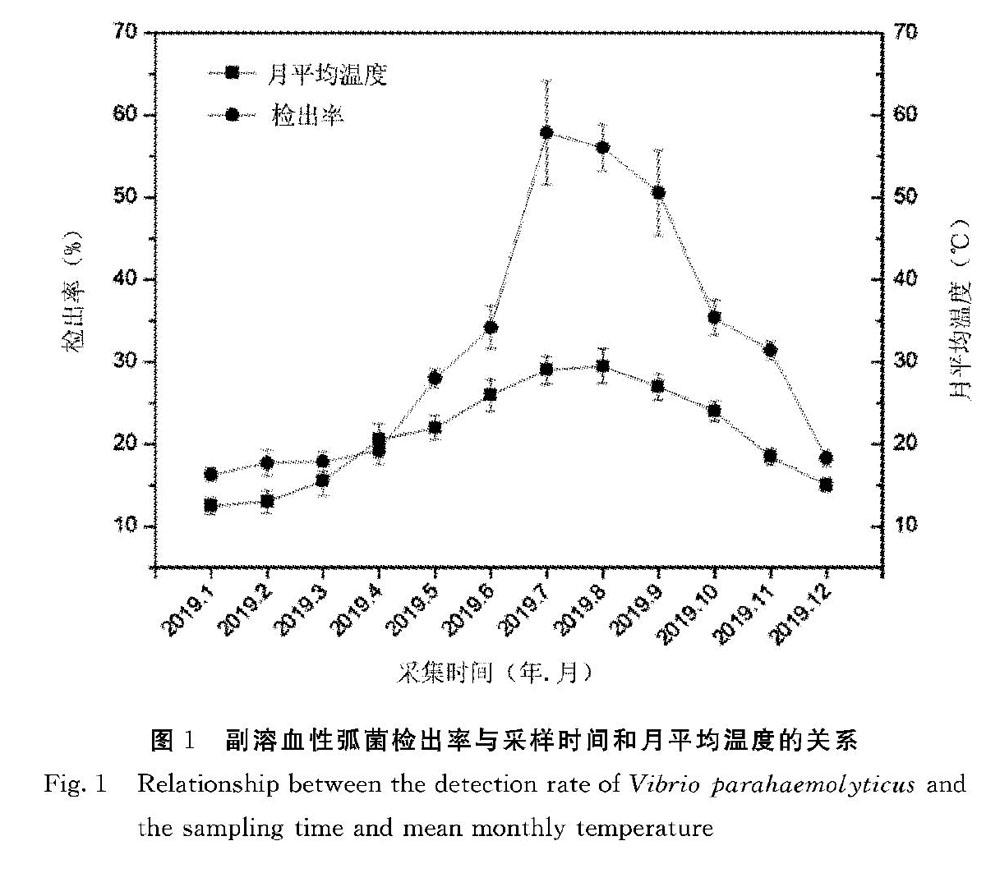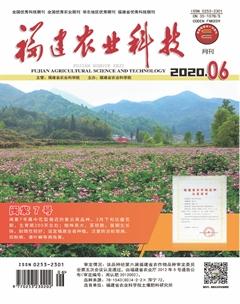福州市售水产品中副溶血性弧菌 污染状况调查
曹晓 何文胜 蔡桔阳 叶亮兴 柯轶



摘 要: 調查福州市售水产品中副溶血性弧菌的污染状况,预防由水产品引起的食源性疾病的发生,并为食品安全监管部门提供参考。随机采集360份市售水产品,按照国家标准 (GB 4789.7- 2013《食品微生物学检验》)进行副溶血性弧菌的分离培养,采用全自动微生物鉴定仪 VITEK 2 Compact鉴定,并用多重荧光 PCR方法进行毒力基因检测。360份样品中共检出115株副溶血性弧菌,阳性检出率为31.94%。其中鱼类检出率31.67%,贝类检出率42.50%,甲壳类检出率21.67%。农贸市场采集的水产品副溶血性弧菌检出率显著高于超市( P =0.003<0.01,χ2= 8.637)。7月份至9月份副溶血性弧菌的阳性检出率处于高峰,12月份、1月份至3月份阳性检出率处于低谷。毒力基因 tlh 携带率为100%, tdh 携带率为29.57%。福州市售水产品都不同程度地受到副溶血性弧菌污染,建议食用时进行彻底加热烹煮,同时避免不同种类水产品间的交叉污染,降低感染的可能性。
关键词: 水产品;副溶血性弧菌;污染;分离鉴定;毒力基因
中图分类号: TS201.3文献标志码: A文章编号: 0253-2301(2020)06-0042-05
DOI:10.13651/j.cnki.fjnykj.2020.06.009
Investigation on the Contamination Status ofVibrio Parahaemolyticusin the Aquatic Products Sold in Fuzhou
CAO Xiao 1, HE Wen-sheng 1, CAI Ju-yang 2, YE Liang-xing 2, KE Yi 1
(1. Fujian Vocational College of Bioengineering,Fuzhou, Fujian 350002, China; 2. Xiamen Hongyi Testing Co., Ltd., Xiamen, Fujian 361000, China)
Abstract:The investigation on the contamination status ofVibrio parahaemolyticusin the aquatic products sold in Fuzhou would prevent the occurrence of foodborne diseases caused by aquatic products and provide references for the departments of food safety supervision. 360 commercially available aquatic products in Fuzhou were collected randomly, and the isolation and culture ofVibrio parahaemolyticuswere conducted according to the national standard(GB 4789.7- 2013 Food Microbiological Analysis). VITEK 2 Compact was used for the identification of the isolated strains and the multiplex fluorescent PCR was used to detect the virulence genes. A total of 115 strains ofVibrio parahaemolyticuswere detected among the 360 samples with the positive detection rate of31.94 %. Among them, the detection rate of fish was31.67 %, the detection rate of shellfish was42.5 %,and the detection rate of crustaceans was21.67 %. The detection rate ofVibrio parahaemolyticusin aquatic products collected from the farmer's market was significantly higher than that from the supermarkets ( P =0.003<0.01 , χ2=8.637 ). The positive detection rate ofVibrio parahaemolyticuswas at its peak from July to September, while the positive detection rate was at a low ebb in December, January, February and March. The carrier rate of virulence gene tlh and was tdh was 100% and29.57 %, respectively. The aquatic products sold in Fuzhou were all contaminated withVibrio parahaemolyticusto varying degrees. It was recommended to heat and cook thoroughly while eating to avoid the cross-contaminationbetweendifferent kinds of aquatic products and reduce the possibility of infection.
不同采样地点的试验结果显示,超市水产品的副溶血性弧菌检出率显著低于农贸市场水产品,原因有可能是超市的整个采购环节和管理制度比较完善,超市环境较为干净整洁,温度适宜,尤其是炎热的夏季,温度的控制极为重要。更重要的是超市水产品严格分类分区销售,不容易造成交叉污染。另外,副溶血性弧菌引起的食物中毒具有明显的季节性,以夏秋为高发季节[12] 。本试验中副溶血性弧菌的检出率曲线与月平均温度曲线的走势相似,即水产品中副溶血性弧菌的检出率随着平均温度的升高而逐渐增多,当平均温度达到最高时(7月份至9月份)检出率达到峰值,而后检出率随着平均温度的降低而减少。由此可见,副溶血性弧菌检出率和温度存在相关性,提示水产品应低温冷藏保存。这也和不同地点检测结果中超市(常年温度25℃左右)的低检出率一致。
副溶血性弧菌的致病力与其产生的毒素(溶血素)有关,即 tlh、tdh和trh,分别由tlh、tdh 和 trh 基因编码[13-17] 。其中,毒力基因 tdh 被认为是副溶血性弧菌最主要的毒力因子[18] 。本次试验检出的115 株副溶血性弧菌中有34 株携带 tdh 基因,所有分离株都不携带 trh 基因,说明(1) tdh 是本地区副溶血性弧菌污染最主要的致病因子,与陈伟伟等[19] 报道的福建不同来源副溶血性弧菌的毒力因子检测结果一致;(2)福州大多数副溶血性弧菌是trh阴性菌株,此结果与国外学者的报道类似[20] 。由于本次试验未进行副溶血性弧菌的PFGE(脉冲场凝胶电泳)分子分型,因此对分离株的溯源分析有待进一步研究。
鉴于以上研究结果,结合副溶血性弧菌的流行病学特征,以及其嗜盐畏酸、不耐高温的特点,作者认为相关部门应加强生鲜水产品的卫生监督和检验,扩大教育宣传范围,提高餐饮从业人员的食品安全意识,降低食源性致病菌感染的风险。同时,要引导广大市民做好对副溶血性弧菌食源性疾病的预防,在食用生鲜水产品时,要烧熟煮透,切勿生食,加工过程中生熟器具分开,烹调和调制水产品时加适量食醋,食用前彻底加热处理,以上措施可以防止生鲜水产以及人群带菌者对其他食品的直接污染,以及由带菌砧板、炊具或容器等造成的间接污染,减少食品安全隐患。本研究为福州市的食品安全监管及食源性疾病的预防控制提供参考,具有一定的借鉴意义。
参考文献:
[ 1] 周祖木.食源性病原微生物和天然毒素相关疾病防控手册[M].北京:人民卫生出版社,2016.
[ 2]柳增善,任洪林,孙鸿斌.食品病原微生物学[M].北京:科学出版社,2015.
[ 3]SUMIO S D.Sixty years from the discovery ofVibrio parahaemolyticusand some recollections[J]. Biocontrol Sci ,2011,16(4) :129-137.
[ 4]SU Y C,LIU C C. Vibrio parahaemolyticus :a concern of seafood safety [J].Food Microbiol ,2007,24(6) :549-558.
[ 5]SHINODA S.Sixty years from the discovery ofVibrio parahaemolyticusand some recollections[J]. Biocontrol Sci ,2011,16(4):129-137.
[ 6]高敏国,张正东,林玉娣.某市近 10 年副溶血性弧菌食物中毒事件流行病学特征分析[J].中国校医,2012,26(11):824-826.
[ 7]韩小龙,张海燕,曹明秀,等.我国海产品中副溶血性弧菌的污染现状与控制策略[J].食品与发酵工业,2015,41(7):263-267.
[ 8]陈瑞英,鲁建章,苏意诚,等.食品中副溶血性弧菌的危害分析[J].食品科学,2007,28(1):341-347.
[ 9]WU Y N,WEN J,MA Y,et al.Epidemiology of foodborne disease outbreaks caused byVibrio parahaemolyticus ,China,2003-2008 [J].Food Control ,2014,46:197-202.
[10]李桂满,颜军,王慧雯,等.2015-2016 年昆明市市售生鲜海产品中副溶血性弧菌污染状况及毒力基因检测[J].职业与健康,2018,34(8):1046-1048.
[11]韩丽娟,张博琳,遇婷,等.2012-2015 年鞍山市水产品中副溶血性弧菌的污染状况[J].职业与健康,2016,32(18):2514-2516.
[12]ALABOUDIA R,ABABNEH M,OSAILI T M,et al.Detection,Identification,and Prevalence of PathogenicVibrio parahaemolyticusin Fish and Coastal Environment in Jordan[J]. Journal of Food Science ,2016,81(1):130-134.
[13]李毅.副溶血性弧菌及其溶血毒素研究进展[J].中国卫生检验杂志,2008,18(12):2835-2839.
[14]谭焕腾,陈晓,蒋俊丽,等.2013-2015 年杭州地区急性腹泻患者来源副溶血弧菌毒力基因及耐药性调查[J].中国微生态学杂志,2017,29(2): 151-154,158.
[15]黎晶晶,黎珊珊,于艳丽. 副溶血弧菌TDH 的原核表达及单克隆抗体的制备[J].食品与生物技术学报,2017,36(3):331-335.
[16]朱江辉.中国食品微生物风险评估进展与展望[J].中国食品卫生杂志,2016,28(2) :139-143.
[17]黄春梅,吴南卫,邓瑶.三亚地区副溶血性弧菌血清分型、毒力基因及药敏分析[J].现代预防医学,2016,43( 9) :1665-1669.
[18]林毅英,潘力,吴清平,等.副溶血弧菌菌株229基因组测序及其致病因子的注释[J].现代食品科技,2018:34(5):76-80.
[19]陈伟伟,林志钦,谢雅真,等.福建不同来源副溶血性弧菌的毒力因子检测[J].海峡预防医学杂志,2011,17(3): 54-56.
[20]ANNICK R P,ALAIN G,JEAN L,et al.Occurrence of the tdh and trh genes inVibrio parahaemolyticusisolates from waters and raw shellfish collected in two French coastal areas and from seafood imported into France [J].Int J Food Microbiol ,2004,91(3):319-325.
(責任编辑:柯文辉)

